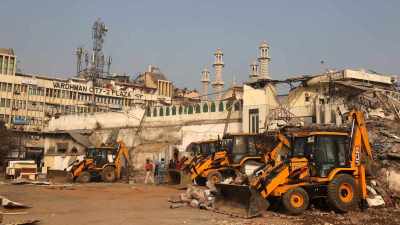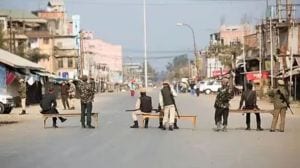Muslims must be generous
The prime minister is suddenly confronted with at least four issues which could make or mar his place in history. Ayodhya, Kashmir, Pakistan...

The prime minister is suddenly confronted with at least four issues which could make or mar his place in history. Ayodhya, Kashmir, Pakistan and the whole debate on whether or not India should take up the administration of what is enticingly being described as the 8220;Indian sector8221; in northern Iraq, which includes Kirkuk.
The first three are inextricably linked but risks on the fourth can only be contemplated if progress on the other issues is promising. Without progress on all fronts, a response to some eager advice on the last issue might look mercenary and mean. A comprehensive progress on all will elevate the region on to a different plane.
Who can fault the prime minister that Ayodhya must be depoliticised? The Shankaracharya of Kanchi is reasonable, too. The other day Sri Sri Ravi Shankar of the Art of Living went one better. Hindus must apologise for having pulled down the Babri Masjid, Muslims must then give up the land for the temple and the two communities must build a grand mosque nearby together.
The position of the secularists is that the judicial route upholds the Constitution. Whichever side wins abides by the Constitution. The Muslim Personal Law Board is, in varying degrees of decibel level, sticking to the position of the secularists. On this issue, the prime minister is in a bind. On the one hand, he is a statesman, pursuing subcontinental harmony. On the other, a politician not exactly hostage to the Parivar8217;s demands but not able to be totally oblivious to them.
Look, they were in power at the Centre for five years and they could not get us that plot of land to build the Ram Mandir. This is what the BJP cadres will say. Senior BJP leaders know the Ayodhya issue has been squeezed dry for any electoral advantage. It is the cadres that have to be mollified.
Kalyan Singh was UP8217;s BJP chief minister when the Babri Masjid was demolished. He is now fighting against the BJP. Then there are the VHP and the Bajrang Dal, implacable, obstinate, either unmanageable or unmanaged.
There is another complication. The Hindu case is based on faith with a potent mix of ancient grievances. The Muslim case is largely based on collective hurt, and a sense of being deprived of their rights guaranteed under the Constitution. The Muslim case is reasonable and logical, but it runs into this irresistible incantation of 8220;faith8221;, which is as much beyond reason as is the Virgin Birth, or the Prophet8217;s journey on a winged horse.
The ASI has found nothing under the mosque. The court case on the title deed will be decided in a year. But will it? If politics takes a vicious turn or, in an atmosphere of general disharmony, a court verdict goes one way or the other, things could get explosive.
The nail-biting suspense over the court verdict, the nation sitting on an edge, the army being deployed, curfew imposed to suspend celebrations by one community or the other8212;all of this is not a recipe for peace. In this atmosphere, how does the prime minister sustain his peace initiative with Pakistan?
That Shariah law in Pakistan8217;s North West Frontier Province, the growth of Taliban in the areas abutting Afghanistan, General Musharraf donning two caps8212;of army chief and president8212;against the wishes of the political establishment, the possibility that Pakistan8217;s nascent democracy could be in danger of being snuffed out, that we may be faced with the prospect of a Talibanised or a less democratic Pakistan8212;all these are unhappy prospects for all of us on the subcontinent.
We must all keep our fingers crossed that Pakistan settles down to being a harmonious, reasonable neighbour, with the political stamina to see the peace process through this extended hurdle race. But we ourselves must ensure harmony at home by defusing Ayodhya innovatively.
The very outlining of the peace process, after the tensions of Gujarat and 9/11, have brought about a new sense of urgency among the Muslims. There is a desire to strengthen the hands of those embarked on peace. The Urdu Press has had some outstanding contributions by writers like Zafar Adeem, talking of a grand gesture on the part of the Muslim community. He has had support in the letters to the editor columns.
More recently, important religious leaders of two major Muslim sects8212; Maulana Saiyid Kalbe Sadiq and Maulana Abdul Karim Parikh8212;have said that all Indians, particularly 150 million Indian Muslims, desire an end to an issue which has harmed the community8217;s interests. A dignified compromise could well be emerging on the horizon. The diehards in the Personal Law Board either pay heed or run the risk of being marginalised. They too must be interested in subcontinental peace and India8217;s rightful place in the world. The time is now. And the route to harmony is mobilisation of Muslim public opinion for generosity and forgiveness.
- 01
- 02
- 03
- 04
- 05






























